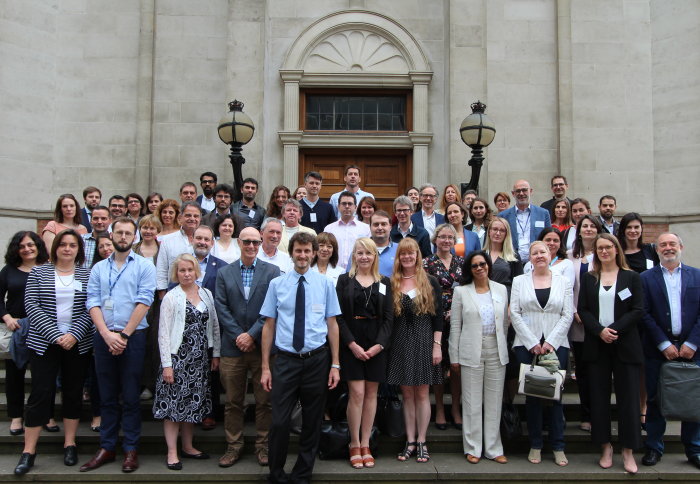€10m project to tackle Europe’s childhood obesity launches at Imperial

Members of the STOP project gather at Imperial for the launch event
Researchers and policy makers from 16 countries gathered at Imperial to launch Europe’s largest research project to tackle obesity in children.
The STOP project (Science and Technology in childhood Obesity Policy), led by a team based at Imperial College Business School, will identify and test the best approaches to the prevention and treatment of obesity, especially in younger children (up to age 12), over the next four years from June 2018 until May 2022.
The project will examine the biological changes and behaviours that lead to obesity and how these are caused by the environments in which people live, by observing 17 large groups of children across Europe.
The project will include a study in Sweden, Spain and Romania to test whether digital technologies can help very young obese children and their families, especially those from disadvantaged backgrounds, to achieve sustainable improvements in body weight.

More than one in ten children aged 5-19 is obese throughout southern Europe, in parts of central-eastern Europe and in the United Kingdom, with more than one in three children overweight in countries such as Greece, Malta and Italy.
"If no effective action is taken, this wave of childhood obesity will lead to more than one in three adults aged 20 and over being obese in the UK by 2025." Professor Franco Sassi Director of the Centre for Health Economics & Policy Innovation, Imperial College Business School
The initiative is also designed to make the food industry and other commercial players accountable for what products children consume and stimulate them to produce innovative solutions to make children’s consumption healthier through a competition that will lead to the award of funds for bringing the most promising innovations to the market.
Among other policies, the project will assess the scope for European governments to use levers such as taxes, nutrition labels and marketing restrictions on foods and beverages in tackling childhood obesity.
The STOP project will be co-ordinated by a team at Imperial College Business School, with participation from Imperial’s School of Public Health and Department of Medicine. Imperial will receive €2 million in funding to carry out its section of the project.
Professor Franco Sassi, Project Leader and Director of the Centre for Health Economics & Policy Innovation at Imperial College Business School said: “This is a significant investment by the European Union to find the most successful and effective approaches to reduce the incidence of childhood obesity while helping children already suffering the disease to get the best support.
“In the United Kingdom, one in ten children is obese, one of the highest childhood obesity rates in Europe. If no effective action is taken, this wave of childhood obesity will lead to more than one in three adults aged 20 and over being obese in the UK by 2025. Projects like STOP can prevent this by identifying and promoting effective solutions to make children more resilient to the influences of an obesogenic environment.”
Professor Majid Ezzati, Chair in Global Environmental Health at Imperial College London’s School of Public Health, said: “Work at Imperial has shown the extent of the childhood obesity. This project will help us take a step towards addressing it. In a society with rising inequalities, our challenge will be how to make healthy foods affordable and accessible to the poor and marginalised groups in every society.”
The STOP project’s partner organisations include other university research departments, government bodies, international organisations (WHO, IARC and OECD), civil society organisations concerned with health and children, as well as European Consortia (EIT Health and EIT Food) promoting innovation in the food and health sectors, respectively. Partner organisations are based in 12 EU member states, along with Switzerland, the United States and New Zealand.
Article text (excluding photos or graphics) © Imperial College London.
Photos and graphics subject to third party copyright used with permission or © Imperial College London.
Reporter
Laura Singleton
Communications Division